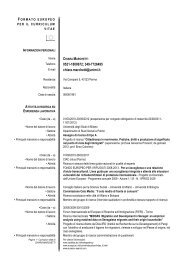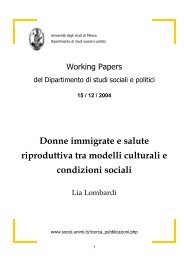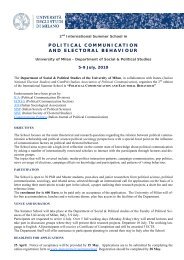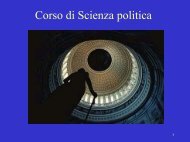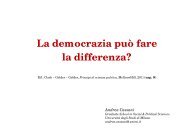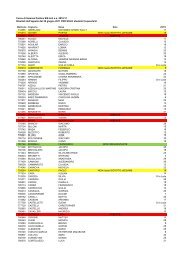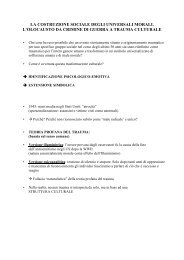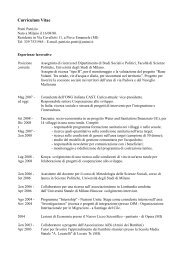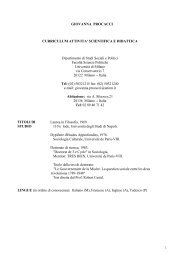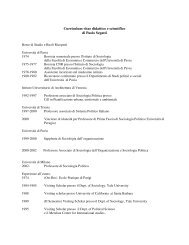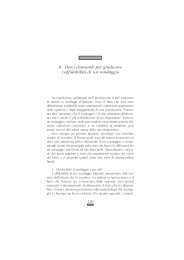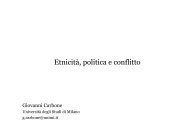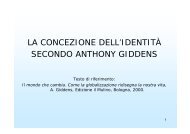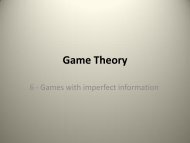The european dimension of political discourse in Italy. A ... - CIRCaP
The european dimension of political discourse in Italy. A ... - CIRCaP
The european dimension of political discourse in Italy. A ... - CIRCaP
Create successful ePaper yourself
Turn your PDF publications into a flip-book with our unique Google optimized e-Paper software.
THE EUROPEAN DIMENSION OF POLITICAL DISCOURSE IN ITALY.<br />
acceptance <strong>of</strong> the very idea <strong>of</strong> the <strong>in</strong>tegration <strong>of</strong> Western Europe played a legitimis<strong>in</strong>g role<br />
for the party to become a potential government partner.<br />
Start<strong>in</strong>g from the seventies, the party preference for the role <strong>of</strong> Western Europe <strong>in</strong> the world<br />
order fluctuated between an idea <strong>of</strong> Europe as an <strong>in</strong>dependent entity, equally distant from<br />
USA and USSR, to an idea <strong>of</strong> peace promotion with the specific mission <strong>of</strong> facilitat<strong>in</strong>g<br />
peaceful relationships between the two Superpowers. At the beg<strong>in</strong>n<strong>in</strong>g <strong>of</strong> the seventies, the<br />
party was still very critical towards the role <strong>of</strong> the United States as a driv<strong>in</strong>g force <strong>of</strong><br />
European <strong>in</strong>tegration and claimed autonomy from the American <strong>in</strong>fluence as a necessary<br />
step. But by the mid-seventies, the strong relationship l<strong>in</strong>k<strong>in</strong>g Western Europe to the United<br />
States started to be rather accepted, lead<strong>in</strong>g the party to talk about …historical ties l<strong>in</strong>k<strong>in</strong>g<br />
Italians to Americans” 15 .<br />
Consequently, the criticism on the outcomes <strong>of</strong> European <strong>in</strong>tegration came to be much more<br />
articulate than <strong>in</strong> the past. Accord<strong>in</strong>g to the Pci, one <strong>of</strong> the ma<strong>in</strong> problems <strong>of</strong> EEC was its<br />
non-democratic nature. This became a recurrent feature <strong>in</strong> party documents throughout the<br />
seventies and, accord<strong>in</strong>g to the Pci, solutions to this problem should <strong>in</strong>clude the direct<br />
election and the strengthen<strong>in</strong>g <strong>of</strong> the powers <strong>of</strong> the EP (at the expenses <strong>of</strong> the Commission<br />
and <strong>of</strong> the Council), a larger control <strong>of</strong> domestic parliaments on European politics and a<br />
larger <strong>in</strong>volvement <strong>of</strong> the work<strong>in</strong>g class <strong>in</strong> the decision-mak<strong>in</strong>g processes.<br />
A crystal-clear evidence <strong>of</strong> the necessity to keep two different <strong>discourse</strong>s together, i.e. an<br />
articulate and deep criticism on the trajectory <strong>of</strong> EEC and the support to a potential new<br />
Europe, <strong>political</strong>ly autonomous and built on basis <strong>of</strong> social cooperation, can be found when<br />
carefully read<strong>in</strong>g the several articles on European <strong>in</strong>tegration published by the partymagaz<strong>in</strong>e<br />
R<strong>in</strong>ascita, between the late sixties and 1979. Here, an <strong>in</strong>creas<strong>in</strong>gly relevant sector<br />
<strong>of</strong> the communist elite could address the new themes <strong>of</strong> the Eurocommunist doctr<strong>in</strong>e<br />
(namely the necessity to democratise the EC and the importance <strong>of</strong> policy harmonisation),<br />
without reced<strong>in</strong>g from the most typical Pci’s criticisms to the EEC (its capitalist nature and the<br />
negative impact <strong>of</strong> EMS and PAC). In this way, a precise communication <strong>discourse</strong> (specially<br />
oriented to activists and voters) traced the roots <strong>of</strong> a new pattern <strong>of</strong> attitudes towards<br />
European <strong>in</strong>tegration, without produc<strong>in</strong>g a disruptive or divisive <strong>in</strong>ternal <strong>discourse</strong> with<strong>in</strong> the<br />
lead<strong>in</strong>g party elite.<br />
In sum, European policies were still found to have a negative impact on a number <strong>of</strong><br />
domestic <strong>in</strong>terests. Among the negative effects that were mentioned, a great emphasis was<br />
placed on the strengthen<strong>in</strong>g <strong>of</strong> capitalism with related phenomena such as monopoly growth,<br />
15 From the Pci platform <strong>of</strong> 1976.<br />
23



